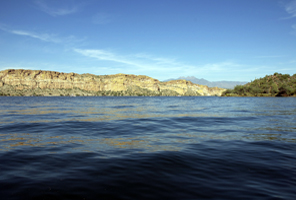February 22, 2013
Authors: Kelli L. Larson (a,b), Arnim Wiek (a), Lauren Withycombe Keeler (a)
Journal of Environmental Management
Volume 116, 15 February 2013, Pages 58–71
Abstract
 In Phoenix, Arizona and other metropolitan areas, water governance challenges include variable climate conditions, growing demands, and continued groundwater overdraft. Based on an actor-oriented examination of who does what with water and why, along with how people interact with hydro-ecological systems and man-made infrastructure, we present a sustainability appraisal of water governance for the Phoenix region.
In Phoenix, Arizona and other metropolitan areas, water governance challenges include variable climate conditions, growing demands, and continued groundwater overdraft. Based on an actor-oriented examination of who does what with water and why, along with how people interact with hydro-ecological systems and man-made infrastructure, we present a sustainability appraisal of water governance for the Phoenix region.
Broadly applicable to other areas, our systems approach to sustainable water governance overcomes prevailing limitations to research and management by: employing a comprehensive and integrative perspective on water systems; highlighting the activities, intentions, and rules that govern various actors, along with the values and goals driving decisions; and, establishing a holistic set of principles for social–ecological system integrity and interconnectivity, resource efficiency and maintenance, livelihood sufficiency and opportunity, civility and democratic governance, intra- and inter-generational equity, and finally, precaution and adaptive capacity.
This study also contributes to reforming and innovating governance regimes by illuminating how these principles are being met, or not, in the study area. What is most needed in metropolitan Phoenix is enhanced attention to ecosystem functions and resource maintenance as well as social equity and public engagement in water governance.
Overall, key recommendations entail: addressing interconnections across hydrologic units and sub-systems (e.g., land and water), increasing decentralized initiatives for multiple purposes (e.g., ecological and societal benefits of green infrastructure), incorporating justice goals into decisions (e.g., fair allocations and involvement), and building capacity through collaborations and social learning with diverse interests (e.g., scientists, policymakers, and the broader public).
Continue to the full text of the article at Science Direct.
(a) School of Sustainability, Arizona State University, Mail Code 5502 Tempe, AZ 85287-5502, USA
(b) School of Geographical Sciences and Urban Planning, Arizona State University, Mail Code 5302 Tempe, AZ 85287-5302, USA

